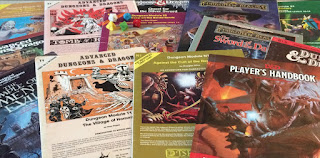@Alphastream wrote:
My unpopular opinion: I don’t think the OGL does much to keep our game alive. Real “life” comes from active community and active developing rules. You can keep playing the same old edition, but that is unlikely to thrive. Look at 5E for thriving.So, I think I know where he’s going with this. If I am not taking him out of context, the opinion is that a new edition has the power of active designers publishing new materials, as well as an active player community. Whereas “old” editions slowly dwindle because there is little new development and new players aren’t really being brought into the community.
He’s not entirely wrong. D&D 5th Edition thrives because of the very active designers and players in the community, creating enthusiasm and outreach to a broader audience.
 As Ryan Dancy wrote: "I also had the goal that the release of the SRD would ensure that D&D in a format that I felt was true to its legacy could never be removed from the market by capricious decisions by its owners." (Paizo forums, Nov 23, 2010)
As Ryan Dancy wrote: "I also had the goal that the release of the SRD would ensure that D&D in a format that I felt was true to its legacy could never be removed from the market by capricious decisions by its owners." (Paizo forums, Nov 23, 2010)You see, when a company like Hasbro acquires an IP like D&D, that doesn’t necessarily mean its future as a pen & paper tabletop game is assured. D&D as a brand is valuable for video games, movies, board games, and other future media (VR? Augmented Reality?).
Luckily for us, Hasbro (it seems) recognized that the value in the brand has tabletop at its heart and has given Wizards of the Coast the autonomy to grow the tabletop part of the brand in the best ways they are able… but it could have gone very differently.
 The other point I think Teos didn’t closely consider is that the OGL is largely responsible for a large portion of the growth of RPGs as a hobby outside of D&D. This is the critical detail, in my mind, of how the OGL benefits the hobby. The OGL is largely responsible for the success of nearly all of the 3rd party publishers out there, making content not just for D&D, but also other IP developed under the OGL.
The other point I think Teos didn’t closely consider is that the OGL is largely responsible for a large portion of the growth of RPGs as a hobby outside of D&D. This is the critical detail, in my mind, of how the OGL benefits the hobby. The OGL is largely responsible for the success of nearly all of the 3rd party publishers out there, making content not just for D&D, but also other IP developed under the OGL.Paizo, Goodman Games, Kobold Press, Troll Lord Games, Green Ronin, Monte Cook Games, Frog God Games… the list goes on. Most of these companies were founded during d20 era when WotC published the d20 System Reference Document. The OGL allowed these nascent publishers to build D&D content (or D&D-like games) without having to worry about hiring costly lawyers to advise on all the IP and copyright restrictions (hazards) of publishing D&D-adjacent titles. The OGL was a one-stop shop for avoiding WotC/Hasbro lawsuits.
After these publishers established success using D&D as a stepping stone, many of them moved on to build other games. Pathfinder, Numenera, 13th Age, Castles & Crusades, Dungeon Crawl Classics, Mutant Future, Spycraft, Cypher System… Manyof these spawned directly out of the d20 SRD, while the others are new creations that grew due to the economic benefit provided by the OGL. These publishers have also grown their own player communities within the hobby.
Final Thoughts
While the OGL may not have “saved” D&D, as a brand, it certainly has provided the hobby the fertile loam upon which independent publishers have grown and flourished which has, in turn, created a healthier ecosystem for D&D and its brethren.
In that way, the OGL has preserved D&D (and other TTRPGs) for future generations, regardless of what company holds the brand.



No comments:
Post a Comment